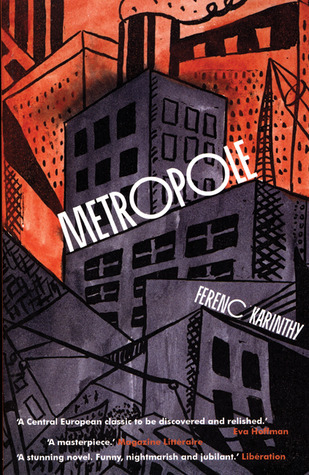
translated by George Szirtes
original publication (in Hungarian): 1970
this edition (in English): Telegram, 2010
236 pages
grab a copy here or through your local independent bookstore or library
Ferenc Karinthy’s Metropole will make you a nervous wreck—that is, if the thought of being trapped in a strange city and unable to communicate with anyone makes you feel nervous. It certainly gives me that feeling. And while the label “Kafkaesque” has been thrown around a lot over the last couple of decades, it perfectly describes this story of a hapless linguist fighting against a sea of uncaring humanity in an effort to find his way home.
Karinthy, the son of the famous Hungarian satirist Frigyes Karinthy, wrote Metropole during the Cold War. Hungary’s own history with the brutality of Communist rule (especially during the 1956 crackdown of Hungarian revolutionaries) informs Metropole, especially in the last scene where a large number of people rise up against the government and then are summarily crushed, the traces of their rebellion almost completely swept away.
Metropole begins with an accomplished linguist, Budai, falling asleep on a plane on his way to a conference in Helsinki and waking up in a strange country. Armed only with his carry-on bag and passport, Budai is pushed by the crowd out of the airport and onto the street. He eventually finds a hotel and tries to ask the receptionist how he can get back to the airport and Helsinki. Everything happens so fast—the receptionist takes his passport (which Budai never sees again) and when Budai holds out some money (as a bribe), the receptionist thrusts local currency into his hands and moves on to the next customer. Budai is shoved aside by the hostile and almost violent crowd and makes his way to his room to think.
The crowds, themselves, are a major feature of this book, including such a wide variety of races and ethnicities that the linguist is utterly unable to determine in what part of the world he has landed. The language the people speak is unintelligible—being a linguist, Budai tries a wide variety of different languages from all around the world, but to no avail. Even his knowledge of ancient Greek and long-dead languages don’t help him. The writing, too, is a complete mystery, despite Budai buying a newspaper and a map and using all of his skills to try and decode them.
In the meantime, he needs to eat, but finds himself stuck in extremely long lines everywhere he goes. The crowds rarely seem to thin out, and the people in them have no compunction about elbowing, shoving, and kicking anyone who gets in their way. Eventually Budai finds a grocery store and takes his dinner back to the hotel. From then on, the linguist tries a variety of tactics to find a way out—he screams at the receptionist, gets himself arrested, and then catches the eye of the elevator operator, who seems to take pity on him. Her name, which she pronounces differently every time she says it, is the title of the Hungarian version of the novel (Epepe). Budai manages to learn a few numbers and phrases from Epepe, but that’s it.
Running out of money, kicked out of the hotel, and desperate, Budai winds up working as a day laborer and living on the streets, only to then get caught up in what seems like a revolution that is quickly put down. His discovery of a river, almost a month after arriving, gives him hope that he’ll be able to find his way out of this unknowable country/city and back home.
Of course, Karinthy’s story can be read in a multitude of ways: as a dream, a hallucination, an allegory, a story of alien abduction, etc. The completely unintelligible language suggests (and Budai even entertains the notion for a minute) that the linguist isn’t even on Earth anymore. No matter how hard he tries, he can’t seem to find the outskirts or city limits, as if the strange place never ends. And even though he regularly sees airplanes overhead, he can never find an airport or a harbor. Only the subway allows him to explore the area, but even that doesn’t help him much. One could read Metropole as an allegory about the inability to truly communicate, even if one understands the language. The protagonist’s disorientation, his inability to escape, and the brutality of the crowds invite one to read the book as portrait of what it felt like to live under Communism in Hungary.
Despite the anxiety that this book will likely provoke, you’ll find yourself unable to put it down. The translation is so smooth and skillful that one can easily forget that it wasn’t originally written in English (how appropriate!).
